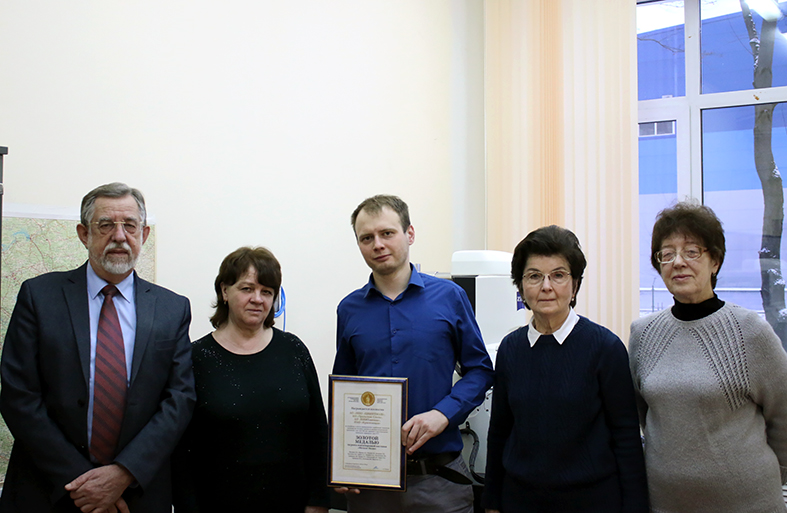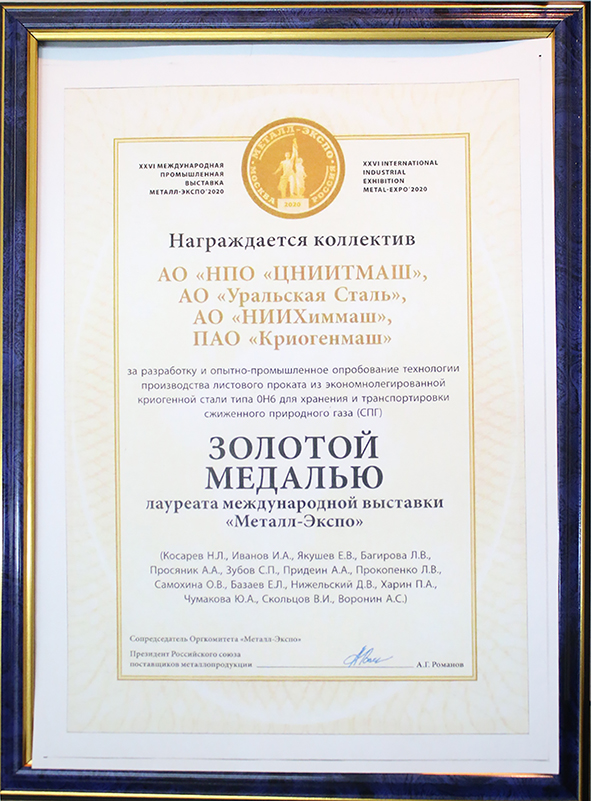The groups of Ural Steel, NPO CNIITMASH, AO NIICHIMMASH and PJSC Cryogenmash were awarded a Gold Medal at the 26th International Industrial Exhibition “Metal-Expo 2020”
04.12.2020
On 4th of December, 2020, Ural Steel (member of Metalloinvest) together with NPO CNIITMASH has developed and produced unique cryogenic rolled steel for the manufacture of equipment operated at temperatures up to -196 °C for the first time in Russia. According to its characteristics, it surpasses existing analogues of Russian and foreign manufacture.


The groups of Ural Steel, NPO CNIITMASH, AO NIICHIMMASH and PJSC Cryogenmash were awarded a Gold Medal at the 26th International Industrial Exhibition “Metal-Expo 2020” for the development and successful pilot testing of the technology for the production of flat rolled products up to 50 mm thick from sparingly alloyed cryogenic steel for manufacture of liquefied natural gas (LNG) storage and transportation vessels.
The LNG use in various industries is growing. At the same time, the relevance of the development of steel for the manufacture of cryogenic apparatus and tanks operated at the boiling point of natural gas -167 ° C increases. We have carried out research work on the development of alloying system, improving of production technology and studying the quality of rolled products test batch of strength grade 450 and 650 from sparingly alloyed steel,” - said Ildar Iskakov, Managing Director of Ural Steel.
Based on the materials of Metalloinvest.
The results of comprehensive studies of the steel presented, carried out in PJSC Cryogenmash metallurgical science laboratory, indicate a sufficiently high reliability of the material and allow us to recommend it for the manufacture of LNG storage and transportation vessels. The methods of mechanical testing, metallography, fractography and microspectral quantitative elemental analysis are used in the study. The properties of steels and their welded joints have been studied at temperatures from -196 °C to + 200 ° C. It has been found that with test temperature decrease, the steels strength characteristics are increased, and the ductility and viscosity are decreased. Based on the results of the study, the temperature range of the possible use of steels was determined.
Austenitic steels with 18% chromium and 10% nickel are most widely used in the Russian Federation for various structures operated at cryogenic temperatures. The lower temperature limit of operation of such steels is equal to minus 250 ° C. For temperatures ranging from room temperature to minus 170 °C, the use of such steels is not always justified and may be replaced by less scarce materials, such as ferritic nickel-containing steels. Steels of this type are relatively cheap, processable, satisfactorily welded and have a sufficient viscosity at low temperatures.
The listed steels are used in the manufacture of a wide range of capacitive equipment with design temperatures from -196 ° C to +300 ° C. This is advisable due to the lower price for rolled products and significantly higher strength characteristics in comparison with austenitic steel. At the same time, the possibility of flat rolled products manufacture in a wide range of thicknesses plays a significant role.
It should be noted that modern trends in the use of sparingly alloyed steels consist in expanding the range of traditional applications to lower temperatures due to a high degree of refining from harmful impurities, optimizing alloying and improving the entire complex of manufacture technology: from smelting and rolling to welding and heat treatment.
Metallurgical properties, welding-processing and service characteristics of the test batch of rolled products were confirmed by comprehensive tests carried out by scientists of AO NIICHIMMASH and PJSC Cryogenmash.


The LNG use in various industries is growing. At the same time, the relevance of the development of steel for the manufacture of cryogenic apparatus and tanks operated at the boiling point of natural gas -167 ° C increases. We have carried out research work on the development of alloying system, improving of production technology and studying the quality of rolled products test batch of strength grade 450 and 650 from sparingly alloyed steel,” - said Ildar Iskakov, Managing Director of Ural Steel.
Based on the materials of Metalloinvest.
The results of comprehensive studies of the steel presented, carried out in PJSC Cryogenmash metallurgical science laboratory, indicate a sufficiently high reliability of the material and allow us to recommend it for the manufacture of LNG storage and transportation vessels. The methods of mechanical testing, metallography, fractography and microspectral quantitative elemental analysis are used in the study. The properties of steels and their welded joints have been studied at temperatures from -196 °C to + 200 ° C. It has been found that with test temperature decrease, the steels strength characteristics are increased, and the ductility and viscosity are decreased. Based on the results of the study, the temperature range of the possible use of steels was determined.
Austenitic steels with 18% chromium and 10% nickel are most widely used in the Russian Federation for various structures operated at cryogenic temperatures. The lower temperature limit of operation of such steels is equal to minus 250 ° C. For temperatures ranging from room temperature to minus 170 °C, the use of such steels is not always justified and may be replaced by less scarce materials, such as ferritic nickel-containing steels. Steels of this type are relatively cheap, processable, satisfactorily welded and have a sufficient viscosity at low temperatures.
The listed steels are used in the manufacture of a wide range of capacitive equipment with design temperatures from -196 ° C to +300 ° C. This is advisable due to the lower price for rolled products and significantly higher strength characteristics in comparison with austenitic steel. At the same time, the possibility of flat rolled products manufacture in a wide range of thicknesses plays a significant role.
It should be noted that modern trends in the use of sparingly alloyed steels consist in expanding the range of traditional applications to lower temperatures due to a high degree of refining from harmful impurities, optimizing alloying and improving the entire complex of manufacture technology: from smelting and rolling to welding and heat treatment.



